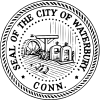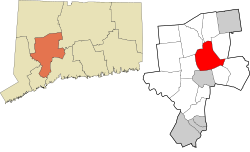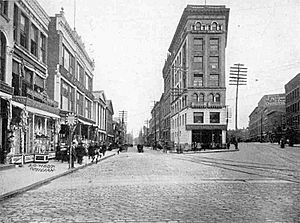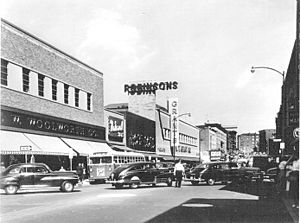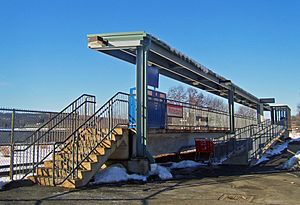Waterbury, Connecticut facts for kids
Quick facts for kids
Waterbury
|
|||||
|---|---|---|---|---|---|
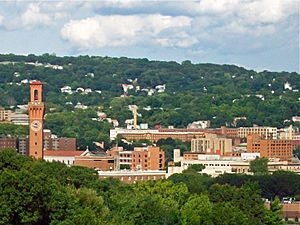
Waterbury skyline from the west, with Union Station clock tower at left
|
|||||
|
|||||
| Nickname(s):
The Brass City,
|
|||||
| Motto(s):
Quid Aere Perennius (Latin)
"What Is More Lasting Than Brass?" |
|||||
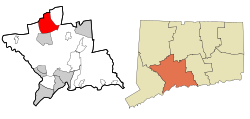 New Haven County and Connecticut New Haven County and Connecticut |
|||||
| Country | United States | ||||
| U.S. state | Connecticut | ||||
| County | New Haven | ||||
| Region | Naugatuck Valley | ||||
| Incorporated (town) | 1686 | ||||
| Incorporated (city) | 1853 | ||||
| Consolidated | 1902 | ||||
| Government | |||||
| • Type | Mayor–council | ||||
| Area | |||||
| • City | 28.94 sq mi (74.97 km2) | ||||
| • Land | 28.52 sq mi (73.87 km2) | ||||
| • Water | 0.42 sq mi (1.09 km2) 1.45% | ||||
| Elevation | 270 ft (82 m) | ||||
| Highest elevation | 820 ft (250 m) | ||||
| Lowest elevation | 220 ft (67 m) | ||||
| Population
(2020)
|
|||||
| • City | 114,403 (US: 258th) | ||||
| • Estimate
(2023)
|
114,990 | ||||
| • Urban | 199,317 (US: 195th) | ||||
| • Urban density | 2,156.2/sq mi (832.5/km2) | ||||
| • Metro | 454,083 (US: 118th) | ||||
| • Metro density | 1,090.13/sq mi (420.90/km2) | ||||
| Time zone | UTC−05:00 (Eastern) | ||||
| • Summer (DST) | UTC−04:00 (Eastern) | ||||
| ZIP Codes |
06701–06720
|
||||
| Area code(s) | 203/475 | ||||
| FIPS code | 09-80000 | ||||
| GNIS feature ID | 0211851 | ||||
| Airport | Waterbury–Oxford Airport | ||||
| Interstates | |||||
| State Routes | |||||
| Commuter rail | |||||
Waterbury is a city in the U.S. state of Connecticut. In 2020, about 114,403 people lived there. The city is about 33 miles southwest of Hartford. It is also about 77 miles northeast of New York City. Waterbury is the largest city in the Naugatuck Valley Planning Region. It is the second-largest city in New Haven County.
In the early 1900s, Waterbury was a major industrial center. It was famous for making brass products. This is why it is called the "Brass City." The city's motto, Quid Aere Perennius?, means "What Is More Lasting Than Brass?" Waterbury also made many watches and clocks, including those by Timex.
The city is located near major highways like Interstate 84 and Route 8. It also has a Metro-North train station. This station connects to Grand Central Terminal in New York City. Waterbury is home to Post University and other college campuses. These include parts of the University of Connecticut and Naugatuck Valley Community College.
Contents
- Waterbury's Past: A Look at Its History
- Waterbury's Location and Climate
- People of Waterbury: Demographics
- Waterbury's Economy and Jobs
- Arts, Culture, and Famous Places
- Education in Waterbury
- Media: News and Entertainment
- City Services and Transportation
- Notable People from Waterbury
- Sister Cities
- Images for kids
- See also
Waterbury's Past: A Look at Its History
Early Beginnings and Native American Roots
The land where Waterbury now stands was first home to Algonquin tribes. In 1674, settlers from nearby Farmington started a community. This first settlement was in the area now called Town Plot.
In 1675, a conflict called King Philip's War caused the settlers to leave. They returned in 1677 and found a new, permanent spot. This new place was across the river, along the Mad River. The Native Americans called the area "Matetacoke," meaning "the interval lands." So, the settlement was first called "Mattatuck" in 1673.
Becoming Waterbury: A City of Many Streams
In 1686, the settlement became the 28th town in the Connecticut Colony. Its name was changed to Waterbury. This name was chosen because many streams flowed into the Naugatuck River from the surrounding hills. At that time, Waterbury included parts of what are now several other towns. These towns include Watertown, Plymouth, and Middlebury.
Growth was slow for the first 100 years. The Naugatuck River often flooded, making it hard to farm. This discouraged many new settlers. The town also faced a big flood in 1691 and an illness outbreak in 1712. After a century, Waterbury's population was only about 5,000 people.
The Rise of Industry: Brass and Clocks
In the early 1800s, Waterbury became an important industrial city. It started making brass products. Factories used the power of the Mad River and Naugatuck River to run their machines. This new brass industry attracted many workers from around the world. People from different countries came to live and work in Waterbury.
Waterbury officially became a city in 1853. It was known as the "Brass Capital of the World." Its brass and copper were used in many places, including Nevada's Boulder Dam.
A very famous product from the late 1800s was Robert H. Ingersoll's one-dollar pocket watch. Five million of these watches were sold! After this, making clocks became as important as making brass. You can still see signs of these industries today. Many old clocktowers and brass factories are now landmarks in the city.
Waterbury also started making silverware in 1858. In 1898, these companies became part of the International Silver Company.
Waterbury During World War II
During World War II, Waterbury's factories were very busy. At its peak, 10,000 people worked at the Scovill Manufacturing Co. The city's metal factories covered over 2 million square feet. They had more than 90 buildings.
On May 24, 1962, a strong tornado hit the north side of the city. It caused a lot of damage and injured many people.
Important Moments in Waterbury's History
- In 1882, Father Michael J. McGivney from Waterbury started the Knights of Columbus. This group grew across the United States.
- St. Joseph's Church, built in 1894, was the first Lithuanian church in Connecticut. It was the second oldest in the country.
- The first Unico Club was founded in Waterbury in 1922. This club helps Italian-Americans and supports education and community programs.
- Sacred Heart was the first Catholic high school in Connecticut, opening in 1922.
- The Waterbury Clock Company made the famous Mickey Mouse watch in 1933. It was so popular that over 11,000 were sold on the first day. This watch helped save the company from financial trouble.
- W1XBS in Waterbury was one of the first radio stations to try high-quality broadcasting in 1934.
- Victor Zembruski started his "Polish Eagles" radio show in 1934. Today, "The Zembruski Family Polka Hour" is one of the longest-running radio shows in America.
Waterbury's Location and Climate
Waterbury covers about 28.94 square miles (75.0 square kilometers). Most of this area is land, with a small part being water.
The city has a humid continental climate. This means it has cold, snowy winters. Summers are warm and humid.
| Climate data for Waterbury, Connecticut | |||||||||||||
|---|---|---|---|---|---|---|---|---|---|---|---|---|---|
| Month | Jan | Feb | Mar | Apr | May | Jun | Jul | Aug | Sep | Oct | Nov | Dec | Year |
| Mean daily maximum °F (°C) | 35 (2) |
39 (4) |
47 (8) |
59 (15) |
70 (21) |
78 (26) |
83 (28) |
81 (27) |
74 (23) |
63 (17) |
52 (11) |
41 (5) |
60 (16) |
| Mean daily minimum °F (°C) | 15 (−9) |
18 (−8) |
26 (−3) |
36 (2) |
46 (8) |
58 (14) |
62 (17) |
60 (16) |
51 (11) |
39 (4) |
31 (−1) |
22 (−6) |
39 (4) |
| Average precipitation inches (mm) | 3.64 (92) |
3.61 (92) |
4.38 (111) |
4.52 (115) |
4.64 (118) |
4.74 (120) |
4.59 (117) |
4.78 (121) |
4.84 (123) |
5.18 (132) |
4.41 (112) |
4.24 (108) |
53.57 (1,361) |
Waterbury's Neighborhoods: A Community Map
Waterbury has many neighborhoods, each with its own history. These areas often have shops and community spaces. This creates smaller "villages" within the city. For many people, their daily life, work, and community were all in their neighborhood. Downtown was the place for theaters, stores, and events.
- Brooklyn
- Bucks Hill
- Bunker Hill
- Country Club
- Crownbrook
- Downtown
- East End
- East Mountain
- Fair Lawn
- Fairmount
- Gilmartin
- Hillside
- Hopeville
- Long Hill
- North End
- North Square
- Overlook
- Pine Hill
- Robinwood
- South End
- Town Plot
- Washington Hill
- Waterville
- West Side
- WOW / Walnut-Orange-Walsh
People of Waterbury: Demographics
| Historical population | |||
|---|---|---|---|
| Census | Pop. | %± | |
| 1860 | 10,004 | — | |
| 1870 | 10,826 | 8.2% | |
| 1880 | 17,806 | 64.5% | |
| 1890 | 28,646 | 60.9% | |
| 1900 | 45,859 | 60.1% | |
| 1910 | 73,141 | 59.5% | |
| 1920 | 91,715 | 25.4% | |
| 1930 | 99,902 | 8.9% | |
| 1940 | 99,314 | −0.6% | |
| 1950 | 104,477 | 5.2% | |
| 1960 | 107,130 | 2.5% | |
| 1970 | 108,033 | 0.8% | |
| 1980 | 103,266 | −4.4% | |
| 1990 | 108,961 | 5.5% | |
| 2000 | 107,271 | −1.6% | |
| 2010 | 110,366 | 2.9% | |
| 2020 | 114,403 | 3.7% | |
| 2023 (est.) | 114,990 | 4.2% | |
| U.S. Decennial Census 2020 Census |
|||
Who Lives in Waterbury?
In 2020, Waterbury had 114,403 people. The city is very diverse. Many different groups of people live there.
Waterbury has a large Italian-American population. About 21% of its residents have Italian heritage. You can see this influence in neighborhoods like Town Plot and Brooklyn. The city is also home to many Albanian, Cape Verdean, Dominican, Brazilian, Jamaican, Lithuanian, Portuguese, and Puerto Rican communities.
There is also a large Irish community. The Washington Hill section hosts the city's annual St. Patrick's Day Parade. Waterbury also has a growing Orthodox Jewish population. This community has grown since 2000, with new schools and services.
Household and Income Information
In 2010, there were 42,761 households in Waterbury. About 31% of these households had children under 18. The average household had 2.46 people.
The median income for a household in Waterbury was $41,136 (from 2010-2014 data). This was lower than the statewide median income of $69,899. About 24% of the people in Waterbury lived below the poverty line. This included about 36.8% of children aged 0-17.
Waterbury's Economy and Jobs
In the 1970s and 1980s, Waterbury's economy faced challenges. However, in 2008, the city was named one of the "100 Best Places to Raise a Family."
Top Employers in Waterbury
Here are some of the largest employers in Waterbury as of 2022:
| # | Employer | # of employees |
|---|---|---|
| 1 | City of Waterbury | 4,044 |
| 2 | Waterbury Hospital | 2,322 |
| 3 | Post University | 2,014 |
| 4 | Saint Mary's Hospital | 1,677 |
| 5 | Naugatuck Valley Community College | 716 |
| 6 | Stop & Shop | 364 |
| 7 | Dunkin' Donuts | 329 |
| 8 | Loehmann-Blasius | 327 |
| 9 | Walmart | 272 |
| 10 | YMCA | 261 |
Arts, Culture, and Famous Places
Waterbury has many interesting landmarks and cultural spots.
Famous Landmarks to Explore
- Union Station: Built in 1900, this historic train station is a beautiful building.
- Holy Land USA: A park with a large illuminated cross on a hill. It was a popular tourist spot in the 1960s and 1970s.
- Municipal Stadium: Built in 1930, this stadium hosts many events.
- The Apothecary Building: A historic building constructed in 1893.
- Soldiers' Monument: A statue honoring the American Civil War, created by local artist George Edwin Bissell.
- Elton Hotel: A grand hotel built in 1905.
- The Cass Gilbert National Register District: Named after architect Cass Gilbert, who designed Waterbury's City Hall.
- The statue of Christopher Columbus: Created by sculptor Frank Gaylord in 1984.
- The Ben Franklin statue: Made in 1921 by sculptor Paul Wayland Bartlett, who lived in Waterbury.
- Waterbury Courthouse: Once the main office for the Anaconda American Brass Company.
- The Waterbury Clock Company buildings: Built in 1857. This company once made 20,000 clocks and watches daily.
- Mattatuck Museum Arts and History Center: A museum that collects and displays art from Connecticut artists.
- Brass Mill Center: A large shopping mall.
- The Palace Theatre: A historic theater built in 1922.
Education in Waterbury
Public schools in Waterbury are managed by Waterbury Public Schools. They are led by a superintendent and a board of education. The city mayor also serves as the chairman of the board.
High Schools in Waterbury
- W.F. Kaynor Technical High School
- Crosby High School
- Kennedy High School
- Waterbury Arts Magnet School
- Wilby High School
- Waterbury Career Academy High School
Middle Schools in Waterbury
- North End Middle School
- Wallace Middle School
- West Side Middle School
Elementary Schools in Waterbury
- B.W. Tinker Elementary School
- Bucks Hill Elementary School
- Bunker Hill Elementary School
- Carrington PreK-8 Elementary School
- Chase Elementary School
- Driggs Elementary School
- Duggan PreK–8 School
- F.J Kingsbury Elementary School
- Generali Elementary School
- Hopeville Elementary School
- John G. Gilmartin PreK-8 Elementary School
- Jonathan Reed PreK–8 School
- Maloney Interdistrict Magnet School
- Regan Elementary School
- Rotella Interdistrict Magnet School
- Sprague Elementary School
- Walsh Elementary School
- Washington Elementary School
- Wendell Cross PreK-8 Elementary School
- Woodrow Wilson Elementary School
Religious Schools in Waterbury
- Alpha and Omega Christian Academy
- Catholic Academy of Waterbury
- Holy Cross High School
- Our Lady of Mt. Carmel School
- Sacred Heart High School (closed in 2021)
- Sacred Heart Middle School
- Saint Joseph's School
- Yeshiva Gedolah of Waterbury
- Yeshiva K'tana of Waterbury
Colleges and Universities in Waterbury
- Naugatuck Valley Community College
- Post University
- University of Bridgeport (Regional Campus)
- University of Connecticut (Regional Campus / Downtown Waterbury)
- Western Connecticut State University (Regional Campus)
Media: News and Entertainment
Waterbury has two newspapers: the Republican-American and the Waterbury Observer.
WATR 1320 AM is a local radio station. It has been owned by the same family since 1934. It plays news, talk shows, and classic hits music. It is the only radio station broadcasting directly from Waterbury.
Two FM radio stations, WWYZ 92.5 (country music) and WMRQ 104.1 (alternative rock), also serve Waterbury. They broadcast from Meriden, Connecticut.
WCCT-TV (channel 20) is a TV station licensed to Waterbury. It is an affiliate for The CW network. Waterbury is part of the Hartford/New Haven media market. This means residents can also receive TV and radio signals from those cities.
City Services and Transportation
Getting Around Waterbury
Waterbury has several public transportation options. CT Transit operates many city buses. These buses run from the city center to different neighborhoods. In 2014, the Hartford-New Britain Busway opened. A local bus connects Waterbury to nearby towns like Cheshire and New Britain. There is also an express bus to Hartford.
Metro-North Railroad runs commuter trains from the Waterbury station to Bridgeport. From Bridgeport, you can connect to Grand Central Terminal in New York City. Waterbury's historic Union Station, built in 1909, is no longer used for trains. Part of the building is now the office for the Republican-American newspaper. Train passengers use a platform next to the old station.
The main highways through Waterbury are I-84 and Route 8. In downtown, these highways are on an elevated bridge called the "MixMaster." This area is known for heavy traffic.
The main airport serving the city is Waterbury–Oxford Airport. The smaller Waterbury Airport is about 4 miles from downtown. Larger commercial airports nearby include Bradley International Airport in Windsor Locks and Tweed New Haven Airport in East Haven.
Police and Fire Departments
The Waterbury Police Department was started in 1853. It has its own police academy.
The Waterbury Fire Department is a full-time, paid department. It has eight engine companies, three truck companies, and other specialized units. They operate from nine fire stations across the city.
Notable People from Waterbury
- Michael Bergin, supermodel and actor on Baywatch
- William H. Bristol, inventor and manufacturer
- Lucia Chase, dancer and ballet director
- Joe Cipriano, television announcer
- Scott Conant, chef and cookbook author
- Roger Connor, Baseball Hall of Fame player
- Bob Crane, actor from Hogan's Heroes
- Justin Credible, professional wrestler
- Joe Diorio, jazz guitarist
- Ryan Gomes, professional basketball player
- Jahana Hayes, U.S. Congresswoman
- Joan Joyce, All-American softball player
- Annie Leibovitz, famous portrait photographer
- Mercedes Martinez, professional wrestler
- Richard A. Mastracchio, NASA astronaut
- Dylan McDermott, actor from The Practice
- Michael J. McGivney, Catholic priest and founder of the Knights of Columbus
- Jimmy Piersall, professional baseball player
- Derek Poundstone, professional strongman athlete
- Sheryl Lee Ralph, Tony Award-nominated actress and singer
- Rosalind Russell, Academy Award-nominated actress
- John Sirica, Watergate judge
- Velvet Sky, professional wrestler
- Gene Tierney, actress
- Fay Vincent, 8th commissioner of Major League Baseball
Sister Cities
 Pontelandolfo, Campania, Italy
Pontelandolfo, Campania, Italy Struga, North Macedonia
Struga, North Macedonia
Images for kids
-
Hotel Elton, 1940s
See also
 In Spanish: Waterbury (Connecticut) para niños
In Spanish: Waterbury (Connecticut) para niños
 | Precious Adams |
 | Lauren Anderson |
 | Janet Collins |



